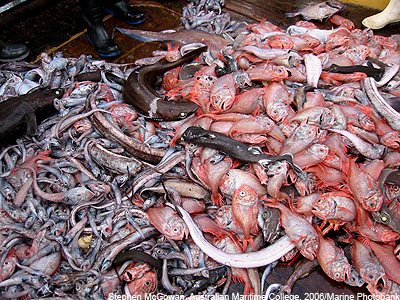NEAFC Falls Short on Deep-Sea Protections
 The 30th annual meeting of the North East Atlantic Fisheries Commission (NEAFC) ended today, with countries agreeing to prohibit fishing for deep-sea sharks but failing to agree on significant, additional measures to safeguard vulnerable deep-sea species and ecosystems. While NEAFC has made considerable progress since 2006 in closing areas on the high seas south of Iceland to bottom fishing, it is has yet to establish effective regulations to ensure sustainable deep-sea fisheries.
The 30th annual meeting of the North East Atlantic Fisheries Commission (NEAFC) ended today, with countries agreeing to prohibit fishing for deep-sea sharks but failing to agree on significant, additional measures to safeguard vulnerable deep-sea species and ecosystems. While NEAFC has made considerable progress since 2006 in closing areas on the high seas south of Iceland to bottom fishing, it is has yet to establish effective regulations to ensure sustainable deep-sea fisheries.
“While we commend NEAFC for prohibiting fishing for deep-sea sharks, we are disappointed that those some protections were not extended to other deep-sea species and ecosystems that continue to be seriously threatened by deep-sea bottom fishing,” said Andrea Kavanagh, director of deep-sea conservation for the Pew Environment Group.
The NEAFC meeting took place two months after the United Nations General Assembly began debating actions taken by NEAFC and other regional fisheries management organizations (RFMOs) to protect the deep sea. The UN adopted a series of resolutions over the past seven years, committing high-seas fishing countries and RFMOs to urgently protect such species and ecosystems from the harmful impacts of deep-sea fishing, in particular bottom trawl fishing.
This week, the European Union put forward proposals to prohibit fishing for orange roughy and 17 species of deep-sea sharks. The proposal to prohibit fisheries targeting deep-sea sharks, amongst the most vulnerable deep-sea species, was adopted. The proposal to ban fishing for orange roughy, based on a recommendation from the International Council for the Exploration of the Sea, was supported by Iceland and Norway, but was not adopted by NEAFC because of opposition from Denmark (the Faroe Islands) and Russian.
“We are disappointed that NEAFC did not do more this year to protect deep-sea ecosystems and sustainably manage deep-sea fisheries, although we were pleased that the meeting this year was much more open to NGO participation than in the past,” said Matthew Gianni, policy adviser for the Deep Sea Conservation Coalition.
NEAFC will conduct a review of its regulations on deep-sea fishing in 2012. A recent report* by the Deep Sea Conservation Coalition (DSCC) indicated substantial shortfalls in NEAFC regulations on deep-sea fisheries. “We urge NEAFC to ensure that the regulations are revised next year to ensure full implerementation of the UNGA resolutions,” said Arni Finnission, Iceland Nature Conservation Association.
The Pew Environment Group, Iceland Nature Conservation Association and the DSCC urge NEAFC to require that all deep-sea bottom fishing be subject to prior environmental impact assessments and that deep-sea fish species, including those that aren't of commercial value but are caught as “bycatch”, are conserved.
*Unfinished business: a review of the implementation of the provisions of United Nations General Assembly resolutions 61/105 and 64/72, related to the management of bottom fisheries in areas beyond national jurisdiction. Available at: www.savethehighseas.org
Background
The Deep Sea Conservation Coalition was founded in 2004 to address the issue of deep-sea fishing on the high seas in the absence of an effective governance regime. The coalition is made up of more than 70 NGOs, fisher organizations, and law and policy institutes committed to protecting the deep sea. www.savethehighseas.org
The Pew Environment Group is the conservation arm of The Pew Charitable Trusts, a nongovernmental organization (NGO) that works globally to establish pragmatic, science-based policies that protect our oceans, preserve our wildlands and promote clean energy. www.PewEnvironment.org
The Iceland Nature Conservation Association (INCA) was established in May 1997. It is conservation NGO, with the primary objective of conserving and protecting the wilderness of Iceland. INCA focuses on fisheries issues by co-operation with the Deep Sea Conservation Coalition, and called for strictest possible implementation of scientific recommendations for fisheries management in Icelandic waters. www.inca.is












